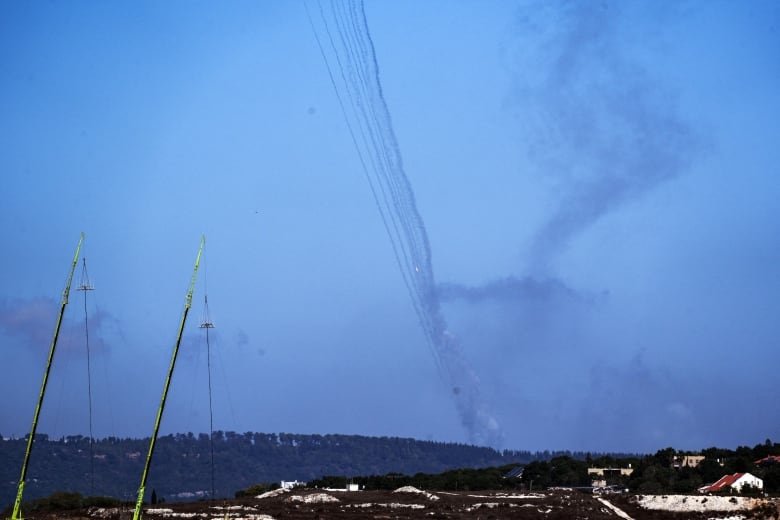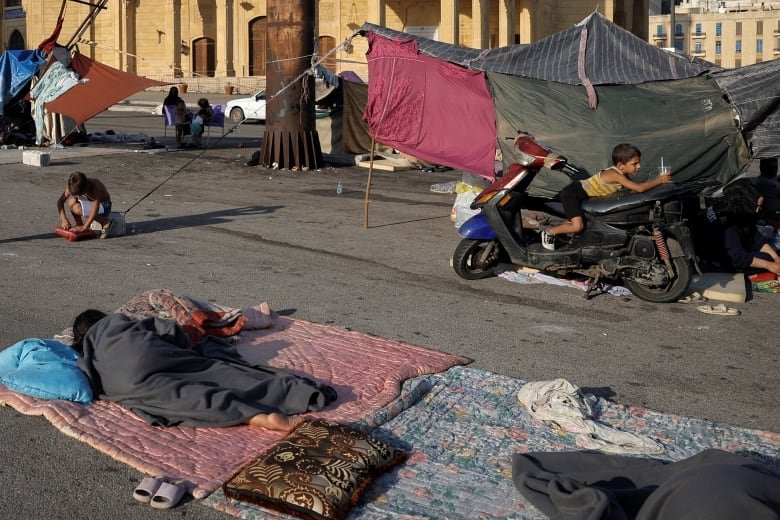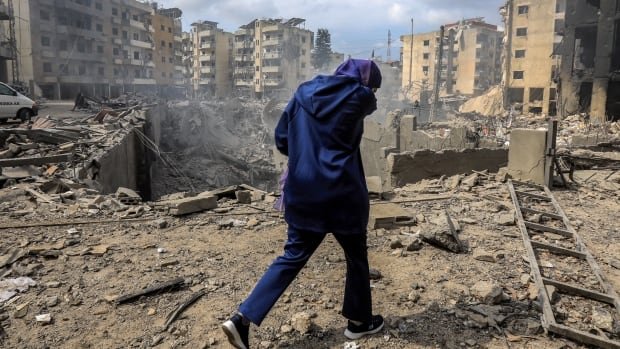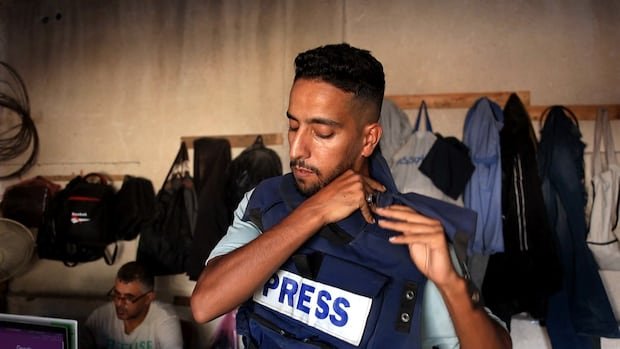In what could be the latest in a series of major blows to Hezbollah, Israeli Defence Minister Yoav Gallant said it appeared the potential successors to slain Hezbollah leader Sayyed Hassan Nasrallah had been “eliminated.”
Hashem Safieddine, a top Hezbollah official, was widely expected to succeed Nasrallah. Safieddine, a cousin of Nasrallah, has not been heard from publicly since an Israeli airstrike late last week.
“Hezbollah is an organization without a head. Nasrallah was eliminated, his replacement was probably also eliminated,” Gallant told officers at the Israeli military’s northern command centre, in a brief video segment distributed by the military.
“There’s no one to make decisions, no one to act.”
Gallant did not provide further details.
Israeli Prime Minister Benjamin Netanyahu echoed Gallant’s statement in a pre-recorded video message Tuesday, without naming the successors he said were killed by the Israeli military.
“We’ve degraded Hezbollah’s capabilities,” Netanyahu said. “We took out thousands of terrorists, including Nasrallah himself and Nasrallah’s replacement, and the replacement of the replacement.”
Earlier Tuesday, Israeli military said it had killed a senior Hezbollah commander in a strike on Beirut while the militant group’s acting leader promised more fighting against Israeli troops in southern Lebanon and rocket fire into Israel.
The military said the strike killed Suhail Husseini, who it said was responsible for overseeing logistics, budget and management of the group.
There was no immediate comment from Hezbollah on either Israeli claims.
Hezbollah says it’s open to ceasefire talks
In televised speech before Gallant’s comments, Hezbollah’s deputy leader said that the group backs efforts to reach a ceasefire in Lebanon, and for the first time omitted any mention of a Gaza truce deal as a pre-condition to halting the group’s attacks on Israel.

Naim Qassem said Hezbollah supported attempts by Speaker of Parliament Nabih Berri, a Hezbollah ally, to secure a halt to fighting, which has escalated in recent weeks with the Israeli ground incursions and the killing of top Hezbollah leaders.
“We support the political activity being led by Berri under the title of a ceasefire,” Qassem said in a 30-minute televised address.
It was not clear whether this signalled any change in stance after a year in which it has said it is fighting in support of the Palestinians during the Israel-Hamas war in Gaza.
Speaking in front of curtains from an undisclosed location, Qassem said the conflict with Israel was a war about who cries first, and Hezbollah would not cry first. The group’s capabilities were intact despite “painful blows” from Israel.
“We are striking them. We are hurting them and we will prolong the time. Dozens of cities are within range of the resistance’s missiles. We assure you that our capabilities are fine,” said Qassem.
Prime Minister Benjamin Netanyahu has called Iran’s ballistic missile strike against Israel a ‘big mistake’ vowing to retaliate. Andrew Chang breaks down Israel’s potential response and the likelihood that Iran’s nuclear facilities, oil refineries, and military infrastructure and leaders could be targeted.
Israel expands incursions in southern Lebanon
Israel’s military said on Tuesday it had begun ground operations in southwest Lebanon, expanding its incursions to a new zone a year after exchanges of fire began with Hezbollah, considered a terrorist organization by many Western organizations, including Canada since 2001.
Israel’s military said on Tuesday it had begun ground operations in southwest Lebanon, expanding its incursions to a new zone a year after exchanges of fire began with Hezbollah, considered a terrorist organization by many Western organizations, including Canada since 2001.
Israel warned those living along the coast between Sidon, or Saida, and the Lebanon-Israel border not to use the beaches or be in the water.
“It’s a big problem for us,” Lebanese Public Works Minister Ali Hamie told CBC’s senior international correspondent Margaret Evans in Beirut. “We have the port of Saida — it’s a commercial port. So we have several public services there. We have our people that they live there…. This is our sovereignty, our land.”
When asked if he was also concerned that Israel’s airstrikes were getting closer to Beirut’s airport, Hamie, who was appointed to his position in Lebanon’s interim government with Hezbollah backing, said he couldn’t confirm that.
“They are bombarding a residential complex, buildings in all territories from the south of Lebanon to the southern suburbs of Beirut … so in this case, I can’t confirm anything.”
He told CBC that Lebanon will continue to engage in ceasefire talks.
“We are doing our duty to resist … because at the end, this is the land of all of us, this is the Lebanese territory’s land … at the same time, the Lebanese government is responsible to continue that discussion with the international community for a ceasefire.”
Iran warns Israel against attacking its territory
The regional tensions triggered a year ago by Palestinian armed group Hamas’s attack on southern Israel have spiralled to a string of Israeli operations by land and air over Lebanon and last week’s direct attacks by Iran onto Israeli military installations.
CBC’s Margaret Evans travelled to Tyre, Lebanon — a trip heavily controlled by Hezbollah — to see the damage from recent Israeli airstrikes and hear from the people who refuse to leave the region despite the danger.
Iran warned Israel on Tuesday against any attacks on the Islamic Republic, a week after Tehran fired a barrage of missiles on it, putting the Middle East on edge.
Any attack on Iran’s infrastructure will be met with retaliation, Foreign Minister Abbas Araqchi said, warning Israel against attacks on his country.
Araqchi will visit Saudi Arabia and other countries in the Middle East starting on Tuesday to discuss regional issues and work on stopping Israel’s “crimes” in Gaza and Lebanon, Iran’s ISNA news agency reported.
Gulf states have sought to reassure Iran of their neutrality in the Iran-Israel conflict, sources told Reuters last week.
Concerns about food supply, hunger in Lebanon
On the ground, the area of Israeli operations in Lebanon has been expanding. The Israeli military said it was conducting “limited, localized, targeted operations” in Lebanon’s southwest, having previously announced such operations in the southeast.
A World Food Program official voiced concern about Lebanon’s food supply, saying thousands of hectares of farmland across the country’s south has burned or been abandoned.
The National’s Adrienne Arsenault asks CBC foreign correspondents Margaret Evans and Chris Brown to break down the major changes in the region one year after the Oct. 7 attacks in Israel.
“Agriculture-wise, food production-wise, [there is] extraordinary concern for Lebanon’s ability to continue to feed itself,” Matthew Hollingworth, WFP country director in Lebanon, told a Geneva press briefing.
Harvests will not occur and produce is rotting in fields, he added.
World Health Organization official Ian Clarke in Beirut told the same briefing that there was a much higher risk of disease outbreaks among Lebanon’s displaced population.

The United Nations Special Coordinator for Lebanon and the head of the UN’s peacekeeping mission in the country said on Tuesday that their repeated appeals for restraint had “gone unheeded” in the year since the exchanges of fire began between Hezbollah and Israel.
“Today, one year later, the near-daily exchanges of fire have escalated into a relentless military campaign whose humanitarian impact is nothing short of catastrophic,” they said in a joint statement.
Israeli airstrikes have displaced 1.2 million people in Lebanon, and Israel’s intensified bombing campaign has worried many Lebanese that their country will experience the vast scale of destruction wrought on Gaza by Israel.
About 2,000 Lebanese have been killed since Hezbollah began firing at Israel a year ago in solidarity with Hamas, most killed in the past few weeks.
With foreign reporters largely barred from entering Gaza, videographer and journalist Mohamed El Saife has been gathering for CBC News on the ground inside the territory. He tells The National’s Adrienne Arsenault about what the past year has been like living and working in a war zone






